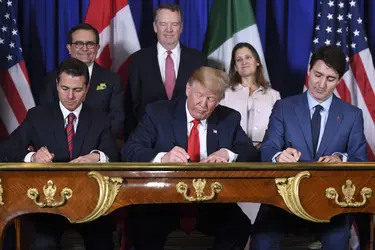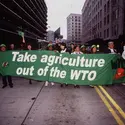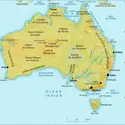PROTECTIONNISME
Bibliographie
M. S. Amiti, S. J. Redding & D. Weinstein « The Impact of the 2018 Trade War on US Prices and Welfare », Working Paper n° 25672, National Bureau of Economic Research,Cambridge (Mass.),2019 (http://www.nber.org/papers/w25672)
D. H. Autor, D. Dorn & G. H. Hanson, « The China syndrome : local labor markets effects of import competition in the United States », in The American EconomicReview, vol. 103, n° 6, pp. 2121-2168, 2013 (https://pubs.aeaweb.org/doi/pdfplus/10.1257/aer.103.6.2121)
K. Bagwell& R. W. Staiger, « An economic theory of GATT », in American EconomicReview, vol. 89, n° 1, pp. 215-248, 1999
P. Bairoch, Histoire économique et sociale du monde du xvie siècle à nos jours, coll. Folio Histoire, Gallimard, Paris, 1997
J. N. Bhagwati, Protectionism, The MIT Press, Cambridge, 1988 ; trad. franç., Protectionnisme, Dunod, Paris, 1990
C. F. Bickerdike, « The Theory of Incipient Taxes », in Economic Journal, vol. 16, pp. 529-535, 1906
A. Bouët, Le Protectionnisme. Analyse économique, Vuibert, Paris, 1998
C. P. Bown, « Taking stock of antidumping, safeguards and countervailing duties, 1990-2009 », in Policy ResearchWorking Papern° 5436, World Bank, Washington, 2010 (http://hdl.handle.net/10986/19912)
C. P. Bown & M. A. Crowley, « Import protection, business cycle and exchange rates: evidence from the Great Recession », in PolicyResearchWorking Paper, n° 6038, World Bank, Washington, 2012 (http://hdl.handle.net/10986/6040)
J. A. Brander & B. J. Spencer, « Export subsidies and market share rivalvery », in Journal of International Economics, vol. 18, pp. 83-100, 1985
S. Delpeuch, E. Fize & P. Martin, « Trade imbalances and the rise of protectionism », in Press Discussion Paper, n° 15742, CEPR, Paris-Londres-Bruxelles, 2021
S. J. Evenett & J. Fritz, The 28th Global Trade Alert Report, CEPR Press,Paris-Londres-Bruxelles, 2021 (https ://www.globaltradealert.org/reports/gta-28-report)
R. Findlay & S. Wellisz, « Endogeneous tariff, the political economy of trade restriction and welfare », in J. N. Bhagwati, Import Competition and Response, chap. 8, Chicago University Press, Chicago, pp. 223-234, 1982
K. Gawande, « The structure of lobbying and protection in US agriculture », in Working Paper, n° 3722, World Bank,Washington, 2005 (http://hdl.handle.net/10986/8262)
G. M. Grossman & E. Helpman, « Protection for sale », in American EconomicReview, vol. 84, no 4, pp. 833-850, 1994
B. Guillochon, Le Protectionnisme, coll. « Repères », La Découverte, Paris, 2001
J. M. Hansen, GainingAccess:Congress and the Farm Lobby, 1919-81, The University of Chicago Press, 1991
D. A. Irwin, « Globalization is in retreat for the first time since the Second World War », Peterson Institute for International Economics, 2020 (https://www.piie.com/research/piie-charts/globalization-retreat-first-time-second-world-war)
H. G. Johnson, « Optimum tariffs and retaliation », in Review of EconomicStudies, vol. 21, pp. 142-153, 1953
P. Krugman, La mondialisation n'est pas coupable : vertus et limites du libre-échange, La Découverte, 1998
F. List, Système national d'économie politique, Capelle, Paris, 1857 ; rééd. coll. « Tel », Gallimard, 1988
S. Magee, W. A. Brock & L. Young, Black Hole Tariffs and Endogeneous Policy Theory, Cambridge University Press, Cambridge, 1989
W. Mayer, « Endogeneous tariff formation », in American EconomicReview, vol. 74, no 5, pp. 970-985, 1984
R. Ossa, « Trade wars and trade talks with data », in The American EconomicReview, vol.104, n° 12, pp. 4104-4146, 2014
D. Rodrik, « Political economy of trade policy », in G. M. Grossman et K. Rogoff, Handbook of International Economics, vol. 3, chap. 28, Amsterdam, Pays-Bas, 1995 ; La Mondialisation sur la sellette. Plaidoyer pour une économie saine, De Boek Supérieur, Bruxelles, 2018
T. Scitovski, « A reconsideration[...]
La suite de cet article est accessible aux abonnés
- Des contenus variés, complets et fiables
- Accessible sur tous les écrans
- Pas de publicité
Déjà abonné ? Se connecter
Écrit par
- Bernard GUILLOCHON : docteur en sciences économiques, professeur émérite à l'université de Paris Dauphine
Classification
Média
Autres références
-
LIBRE-ÉCHANGE ET PROTECTIONNISME DES XVIIIe ET XIX e SIÈCLES - (repères chronologiques)
- Écrit par Francis DEMIER
- 131 mots
1786 Traité de commerce de libre-échange entre la France et la Grande-Bretagne.
1806 Tarif protectionniste français.
1815 La Corn Law protège l'agriculture britannique.
1822 Tournant prohibitionniste de l'économie française.
1846 Abolition des corn laws.
1849 Abolition de l'acte...
-
AGRICOLE RÉVOLUTION
- Écrit par Abel POITRINEAU et Gabriel WACKERMANN
- 8 077 mots
« L'habitude s'est prise de désigner, sous le nom de révolution agricole, les grands bouleversements de la technique et des usages agraires qui, dans toute l'Europe, à des dates variables selon les pays, marquèrent l'avènement des pratiques de l'exploitation contemporaine » (Marc Bloch)....
-
AGRICULTURE - Politiques agricoles et négociations internationales
- Écrit par Laurence ROUDART
- 10 575 mots
- 6 médias
...soudains d’importations en élevant des barrières douanières. Les opposants à cette mesure, en particulier les États-Unis, craignent qu’elle n’encourage le protectionnisme. Les négociations ont buté sur les marchandises concernées, sur les seuils de déclenchement du mécanisme et sur le niveau de protection.... -
AMÉRIQUE LATINE - Évolution géopolitique
- Écrit par Georges COUFFIGNAL
- 7 515 mots
...général de la C.E.P.A.L. (Commission pour l'Amérique latine de l'O.N.U.), sous le nom d'« industrialisation par substitution d'importations » (modèle ISI), postulait que le marché intérieur devait être protégé par d'importantes barrières douanières et par une infinité de contrôles pour permettre la constitution... -
AUSTRALIE
- Écrit par Benoît ANTHEAUME , Jean BOISSIÈRE , Bastien BOSA , Vanessa CASTEJON , Encyclopædia Universalis , Harold James FRITH , Yves FUCHS , Alain HUETZ DE LEMPS , Isabelle MERLE et Xavier PONS
- 27 359 mots
- 29 médias
...(A. Fischer), il ravit le pouvoir aux conservateurs de Deakin, qui avaient pratiqué une politique d'organisation de la fédération à l'intérieur, et de protectionnisme économique et racial à l'extérieur (vote, en 1901, de la « loi des cinquante mots », qui permet, sous prétexte d'analphabétisme, d'interdire... - Afficher les 44 références




